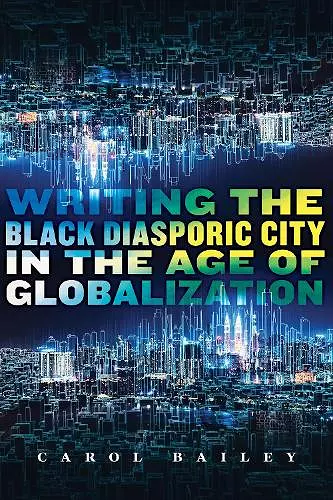Writing the Black Diasporic City in the Age of Globalization
Format:Paperback
Publisher:Rutgers University Press
Published:16th Dec '22
Should be back in stock very soon

Writing the Black Diasporic City in the Age of Globalization theorizes the city as a generative, “semicircular” social space, where the changes of globalization are most profoundly experienced. The fictive accounts analyzed here configure cities as spaces where movement is simultaneously restrictive and liberating, and where life prospects are at once promising and daunting. In their depictions of the urban experiences of peoples of African descent, writers and other creative artists offer a complex set of renditions of twentieth- and twenty-first-century Black urban citizens’ experience in European or Euro-dominated cities such as Boston, London, New York, and Toronto, as well as Global South cities such as Accra, Kingston, and Lagos—that emerged out of colonial domination, and which have emerged as hubs of current globalization. Writing the Black Diasporic City draws on critical tools of classical postcolonial studies as well as those of globalization studies to read works by Ama Ata Aidoo, Amma Darko, Marlon James, Cecil Foster, Zadie Smith, Michael Thomas, Chika Unigwe, and other contemporary writers. The book also engages the television series Call the Midwife, the Canada carnival celebration Caribana, and the film series Small Axe to show how cities are characterized as open, complicated spaces that are constantly shifting. Cities collapse boundaries, allowing for both haunting and healing, and they can sever the connection from kin and community, or create new connections.
"Writing the Black Diasporic City in the Age of Globalization is a defining book for our times. Carol Bailey offers a fresh analysis of the ways the racist underpinnings of globalized capitalism work to systemize the erasure of black lives dispersed, corralled, and active within urban geographies. The book’s meticulous attention to particularity and difference in different locales and texts—a wide sweep from Kingston to Antwerp, Lagos to New York, London to Toronto—is what makes its argument most compelling. Writing the Back Diasporic City is a salutary antidote to prevailing activist discourses of black victimhood." -- Curdella Forbes * author of From Nation to Diaspora: Samuel Selvon, George Lamming and the Cultural Performance of Gen *
"Carol Bailey’s Writing the Black Diasporic City in the Age of Globalization is a powerful, nuanced, and ground-breaking interrogation of the gendered experiences—challenges and triumphs—of people of African descent in global cities. It is a brilliant and indispensable addition to the literature of the Black diaspora. Bailey seamlessly merges history, theory, and close textual reading in an accessible way." -- Katwiwa Mule * author of Women's Spaces, Women's Visions: Politics, Poetics, and Resistance in African Women's Dram *
ISBN: 9781978829664
Dimensions: 229mm x 152mm x 15mm
Weight: 45g
195 pages